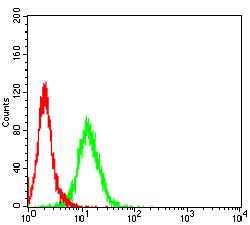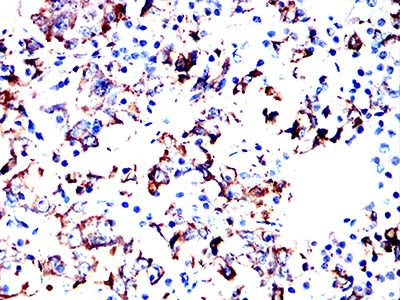PRL Primary Antibody
Item Information
Catalog #
Size
Price
Description
This gene encodes the anterior pituitary hormone prolactin. This secreted hormone is a growth regulator for many tissues, including cells of the immune system. It may also play a role in cell survival by suppressing apoptosis, and it is essential for lactation. Alternative splicing results in multiple transcript variants that encode the same protein.
Product Overview
Entrez GenelD
5617
Aliases
GHA1
Clone#
4E10H9
Host / Isotype
Mouse / Mouse IgG2a
Species Reactivity
Human
Immunogen
Purified recombinant fragment of human PRL (AA:29-227) expressed in E. Coli.
Formulation
Purified antibody in PBS with 0.05% sodium azide
Storage
Store at 4°C short term. Aliquot and store at -20°C long term. Avoid freeze/thaw cycles.
Product Applications
WB (Western Blot)
1/500 - 1/2000
IHC_P(Immunohistochemistry)
1/200 - 1/1000
FCM (Flow Cytometry)
1/200 - 1/400
ELISA
1/10000
References
1.Seizure. 2022 Feb;95:75-80.
2.Front Endocrinol (Lausanne). 2021 Oct 21;12:747810.
2.Front Endocrinol (Lausanne). 2021 Oct 21;12:747810.
Product Image
Elisa

Figure 1:Black line: Control Antigen (100 ng);Purple line: Antigen (10ng); Blue line: Antigen (50 ng); Red line:Antigen (100 ng)
Western Blot

Figure 2:Western blot analysis using PRL mAb against human PRL (AA: 29-227) recombinant protein. (Expected MW is 25.8 kDa)
Western Blot

Figure 3:Western blot analysis using PRL mAb against HEK293-6e (1) and PRL (AA: 29-227)-hIgGFc transfected HEK293-6e (2) cell lysate.
Immunofluorescence analysis

Figure 4:Flow cytometric analysis of Hela cells using PRL mouse mAb (green) and negative control (red).
Immunohistochemical analysis

Figure 5:Immunohistochemical analysis of paraffin-embedded hypophysis tissues using PRL mouse mAb with DAB staining.
For Research Use Only. Not for use in diagnostic procedures.

